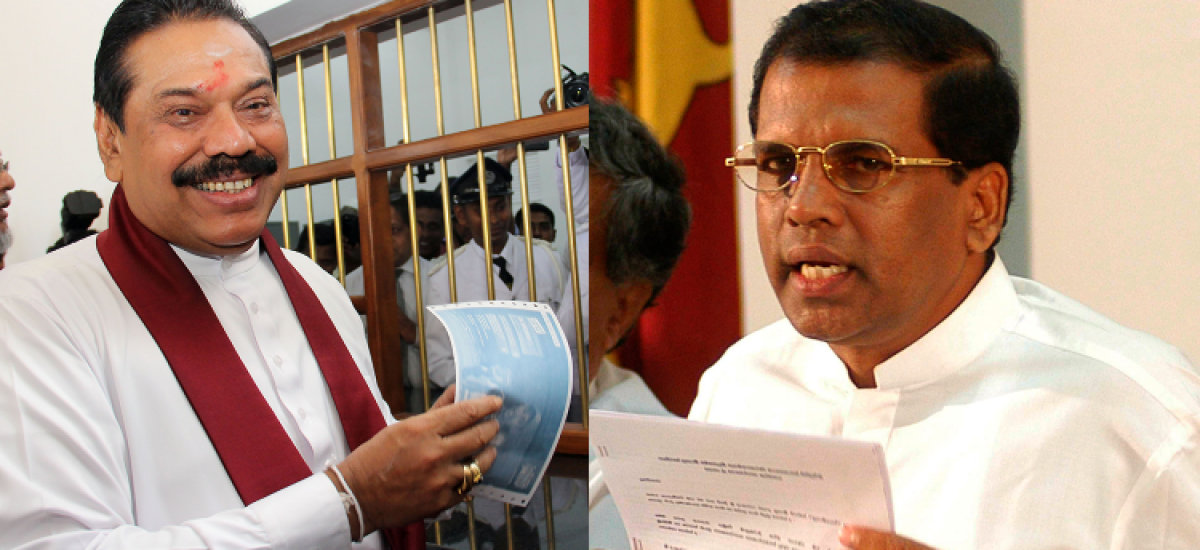Image via Al Jazeera
No less a person than the JHU’s General Secretary, Patali Champika Ranawaka, went on record over the past weekend, stating that every attempt at campaigning by the joint opposition is being violently and illegally suppressed by the Rajapakse regime. He stated that if democratic dissent and a genuine electoral process did not occur, the country would slip back to the era of extra parliamentary and violent opposition to the regime. A free and fair election, at least by Sri Lanka’s own flawed standards is a must for us to continue our claims to be a democracy. That claim is being negated by the unprecedented abuses of the entire election process by the Rajapakse campaign. Notwithstanding the same, the joint opposition campaign is graining traction, politically because the SLFP is not really running too hard on behalf of Rajapakse’s and administratively because officials and police are no longer certain that come January 9th that the Rajapakse regime will remain and accordingly are loath to accept illegal commands. The IGP standing up to the Law and Order Ministry on the illegal transfer of police officers is a good example.
It is in this context, that the Roman Catholic Bishop of Anuradhapura, His Grace Norbert Andradi, was quoted in the press earlier in the week as stating that this was not an opportune time for the Pope to visit Sri Lanka and claimed that several other Bishops too shared this view and also expressed concern about the misuse of the Papal visit for political advantage at the election. However, this caution about the visit, has been pulled back through a pastoral letter by the Catholic Bishops Conference welcoming and anticipating the visit. Now the Vatican foreign ministry and security desired to access the post election climate prior to making a final decision on the visit. However, the pre election environment has been so badly tarnished that for the Pope to visit Sri Lanka in the immediate aftermath of a disputed, flawed and violent election, might be just unsuitable for the Holy Father. However, many observers believe that the visit of the Pope will act as a damper to any thoughts of post-election violence.
The TNA and the JVP
Two important political parties, the Tamil National Alliance (TNA) and the Janatha Vimukthi Peramuna (JVP) arguably the third and fourth political forces in the country, have both adopted a similar strategy, which is actually working well for the joint opposition’s National Democratic Front (NDF) of Maithripala Sirisena. The NDF holds out the promise of a National Government of both the UNP and the SLFP, under a “Maithri palanaye” in a post Rajapakse political environment. The general expectation is that with a Rajapakse defeat the SLFP will revert back to a Chandrika Bandaranaike Kumaratunga and Maithripala Sirisena leadership, especially when it holds the promise of continued partnership in government, as opposed to languishing in opposition.
Not directly joining in this process, is both the JVP and the TNA for slightly different but also similar reasons. The JVP would be well placed to be the small but main opposition to a UNP- SLFP combine, while the TNA or its predecessor the TULF / Federal Party, which historically does not hold executive office in government, except for its one experiment under Dudley Senanayake, can continue to represent the interest of its constituency from outside the executive.
However, both the TNA and the JVP will play a crucial role in the presidential election, because this early presidential election, wanted by no one expect President Rajapakse, is in fact, a request from Mahinda Rajapakse to continue to rule this country for seven more years ( six year term plus one from the current term) or until 2022 as opposed to retiring in 2016. The JVP is already busy telling their supporters countrywide that a further term for Mahinda Rajapakse is not in the interest of all Sri Lankans. Essentially the TNA is most likely to be telling its constituency the exact same thing. After all Sinhalese and Tamils have many if not more shared common interests, than just only competing ones. Listen carefully to ITAK spokesman, Human Rights lawyer MA Sumanthiran and several things become clear. Firstly the ITAK / TNA believes that a democratic and law abiding Sri Lanka is beneficial to everyone including the Tamil people. After all minority rights cannot exist in an environment where all rights are at stake. Incidentally, MP Sumanthiran was a leading part of Chief Justice Bandaranaike’s impeachment defense team and put up a valiant fight to prevent the usurpation of judicial power by the Rajapakse presidency.
Moreover, the Tamil people like to exercise their franchise, something which some misguided sections of the Tamil Diaspora should bear in mind as it supports the Rajapakse campaign’s dream of a Tamil vote boycott. It was such a Tamil boycott in the close 2005 election which saw Mahinda Rajapakse elected. On that occasion with allegations of having paid the LTTE money, via an alleged Tiran Alles deal to boycott the vote. History must not repeat itself. However, the real lesson of the 2005 election was this, in the Batticalo District, where the LTTE was weakened post the Karuna defection, the Tamil people disregarded the LTTE boycott call and voted in droves for the UNP. If the LTTE could not stop the Batticaloa voter in 2005, one pities some Diaspora busybodies, playing to the Rajapakse campaign’s dreams of seeing a Tamil vote boycott in 2015.

